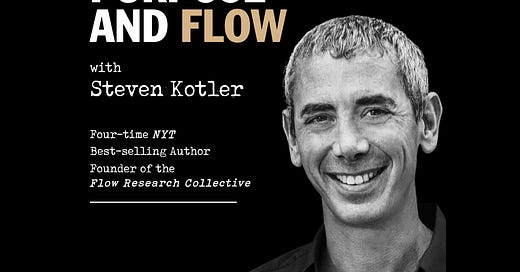The Science of Optimal Experience: A Conversation With NYT Best-selling author Steven Kotler
YouTube | Apple Podcast | Spotify | Buzzsprout | Website
We’re all familiar with the glib screensaver dream: “a hammock on the beach, between two palm trees, cocktail in hand, looking out over the turquoise sea.”
In his book Transcend, Scott Barry Kaufman argues that our ideas of “paradise” tend to be fantasies about the things we lack: to a starving man, paradise is an opulent, all-you-can-eat buffet; to a testosterone-packed, sexually frustrated teenager, a group of horny virgins may seem the ultimate reward.
Along these lines, the screensaver dream strikes me as the fantasy of the overworked office crowd: a life of rest and tranquillity, devoid of tedious tasks to complete. What could be better?
It turns out, quite a lot.
In the ‘80’s, a psychologist at the University of Chicago named Mihaly Csikszentmihalyi wanted to understand what made people perform and feel at their very best. Through a series of experiments, surveys and his own inimitable philosophical integrations, he slowly built a framework for what he called “optimal experience”.
In short, he found that the best moments in people’s lives weren’t the passive, relaxing times. Rather, they were the times when a person’s whole being was stretched to its limits in an effort to accomplish something difficult and worthwhile.
There was another element to optimal experience, however. People described it as playful and exploratory. Almost effortless.
There was one word in particular that people kept using to describe how these experiences felt, one that would eventually act as the primary label for this entire new field of study.
And so Flow became the title of his seminal book in 1990. This would mark the start of a whole new generation of psychology and peak performance research.
Since then, flow has been the subject of hundreds of scientific studies, including some exploring the relationship between flow and creativity, physical exercise, relationships, supplementing, and elite performance in business. The research shows that more flow usually brings with it better performance, less burnout, more life satisfaction, and greater resilience.
With each passing year, we gain a better understanding of the mechanics and methods of flow, and it seems ever more central to processes like learning, peak performance, creativity, optimal group dynamics and purpose.
--
My guest in this episode of the podcast, Steven Kotler, has probably done more to synthesize and spread useful knowledge around flow states than anyone in the world. He’s written eleven best-selling books, including six on flow.
In 2019, he founded the Flow Research Collective 2019 with the goal of advancing flow research and teaching a general audience about its core concepts.
Our conversation spans some of the most important aspects of his work: what the “flow triggers” are and what they all have in common, what the flow cycle looks like in practice, why purpose enhances flow, and the life habits that support a high-flow lifestyle.
It may all sound a bit unrealistic until we learn that evolution has wired us for flow, for reasons Steven unpacks in the conversation.
Steven’s work is extremely effective at teaching us how to better leverage our biological and psychological circuitry for well-being and peak performance in a jargon-free, readily accessible way.
I hope you all enjoy it – you can start with this short clip about how taking more risk can help push us into flow, but only after following an important – and simple – pre-requisite.




